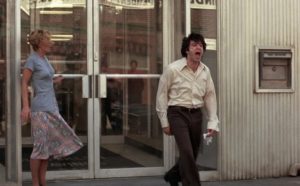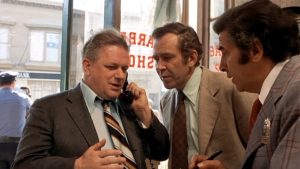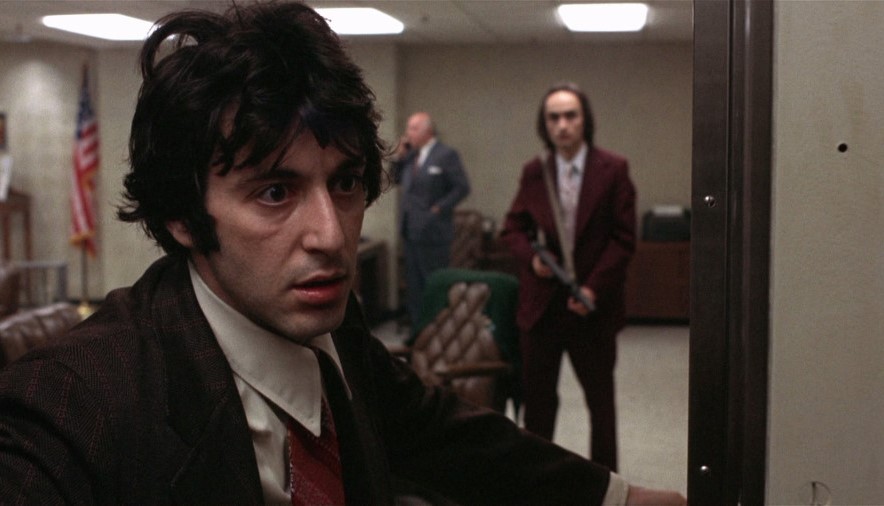“Dog Day Afternoon” deconstructs the idea of the heist picture. In fact, it may not be a heist movie at all. The film is directed by Sidney Lumet (“12 Angry Men”) and brings together Al Pacino and John Cazale as two bizarre and feckless thieves who find themselves trapped in a bank, surrounded by cops and news crews, with seemingly no way out. “Dog Day Afternoon” won an Oscar for ‘Best Writing, Original Screenplay,’ and mixes the humor and frustration of a crime gone wrong with the psychology of its main antagonist that becomes more elusive as the movie intensifies.
The movie and robbery are based off real events of a 1972 crime by John Wojtowicz (here named Sonny) and two accomplices that took place during one afternoon in Brooklyn that soon stretched into the night. His accomplices Sal and Robert (the latter named ‘Stevie’ in this film) are here represented by Cazale and Gary Springer. Stevie abandons the robbery due to nerves moments in; Sal would remain with Sonny (Pacino) until the end.
Like all good movies, what works about “Dog Day Afternoon” is that it paints Sonny’s crime, and the events that follow, in an objective way absent of moralizing. We see the kind of guy Sonny is – frantic but cool under pressure, extremely smart yet overcome by a calculation of errors that make the mission a failure from the word go. Sonny makes his way into the vault and discovers the bank has near or around $1,500 in cash on hand; not at all the bounty he intended. It isn’t long before he and Sal are made as robbers by onlookers who report their position. A standoff ensues, with Sonny having to deal with his eight or nine hostages and the police, led by a cop named Moretti, played by Charles Durning.
 The acting in “Dog Day Afternoon” is top craft, with Pacino, only a year off of his renowned “The Godfather: Part II,” turning in a performance unlike any we’ve seen. He’s anxious, soft spoken, calculating, irrational, hopeful. The event quickly becomes a media circus with hundreds of people cramming into the small city block. Sonny meets with cops outside – at first just to talk, later to barter for means to escape, making it known that his partner Sal will kill all the hostages if anything happens to him.
The acting in “Dog Day Afternoon” is top craft, with Pacino, only a year off of his renowned “The Godfather: Part II,” turning in a performance unlike any we’ve seen. He’s anxious, soft spoken, calculating, irrational, hopeful. The event quickly becomes a media circus with hundreds of people cramming into the small city block. Sonny meets with cops outside – at first just to talk, later to barter for means to escape, making it known that his partner Sal will kill all the hostages if anything happens to him.
We believe him. One could probably write an entire film review on Cazale’s role in “Dog Day Afternoon,” as he sits, quiet, for most of the movie, sub-machine gun in hand. He says bizarre things, such as asking Sonny to fly them to Wyoming when Sonny asks what country he’d like to go to. He also takes objection to the media referring to the two robbers as ‘homosexual’ after they learn that Sonny is. But we see he also means business. When Sonny threatens to kill the hostages early on, Sal inquires with eerily calm interest: “Were you serious about what you said? Because I’m telling you right now, I’m ready to do it.”
The most interesting aspect of “Dog Day Afternoon” is the two-fold character Sonny plays. The movie is not about whether or not Sonny gets away with his crime. In fact, he acts and functions in ways that make you suppose that he won’t. He’s also an enigma. To his hostages and Sal he’s oddly kind; he’s not even that mean or rude to the cops. So when the cops bring in Sonny’s lover Leon (Chris Sarandon), or his wife Angie (Susan Peretz) to talk to him on the phone, and they begin intimating horrible things he’s said or done to them, it makes you question what part of Sonny is real and what part isn’t.
 Leon in particular makes puzzling additions to the movie. While Sonny clearly loves him, Leon has tried desperately to get away from him due to domestic abuse; though one of the reasons Sonny has robbed the bank is to pay for Leon’s sex change operation. A scene where the two discuss their past and future on the phone, one in the bank surrounded by hostages, the other in a room surrounded by cops, is brilliantly written, acted, and directed. It offers deep character insight into Sonny and an odd sense of finality that seems to fly in the face of a movie about a simple bank robbery.
Leon in particular makes puzzling additions to the movie. While Sonny clearly loves him, Leon has tried desperately to get away from him due to domestic abuse; though one of the reasons Sonny has robbed the bank is to pay for Leon’s sex change operation. A scene where the two discuss their past and future on the phone, one in the bank surrounded by hostages, the other in a room surrounded by cops, is brilliantly written, acted, and directed. It offers deep character insight into Sonny and an odd sense of finality that seems to fly in the face of a movie about a simple bank robbery.
You could easily look up the true story of John Wojtowicz and learn how “Dog Day Afternoon” ends, but to talk about that would only serve as a desperate spoiler. The film is as enigmatic as Sonny. It’s a movie about a robbery and a desperate man, and along the way makes clever insights into abusive relationships, incompetence and violence from both criminals and the police, and about a man who may have indeed been so broken he himself didn’t even realize it. It’s a marriage of acting, screenplay, and filmmaking. Its ending shot, the camera focused on the pain and agony of Sonny’s face in long closeup, creates an image that stays with you.
If you like fast paced heist films like “The Italian Job” or “Ocean’s Eleven” you’ll find difficult footing here. “Dog Day Afternoon” is a character study through and through; Pacino and Lumet have produced a crime thriller that is as introspective as it is bizarre. It certainly makes for a genre bending film way ahead of its time.


